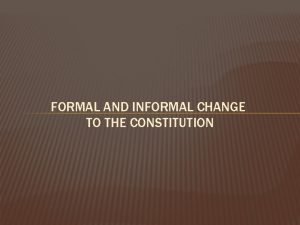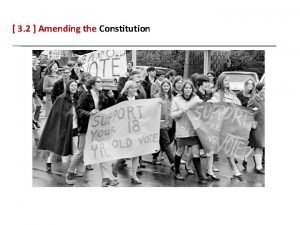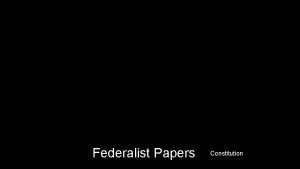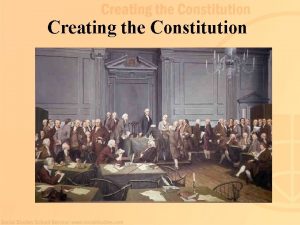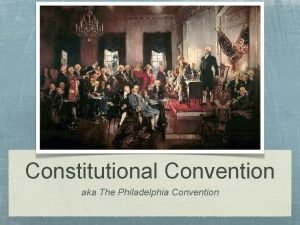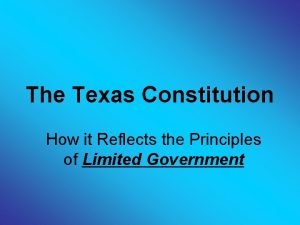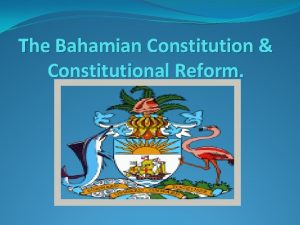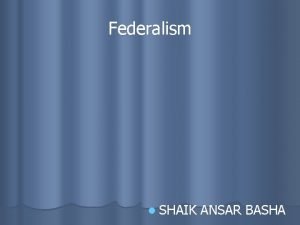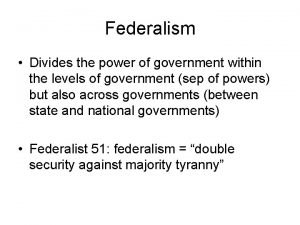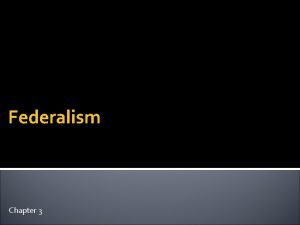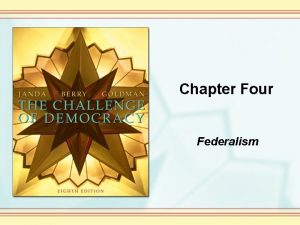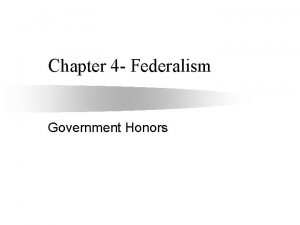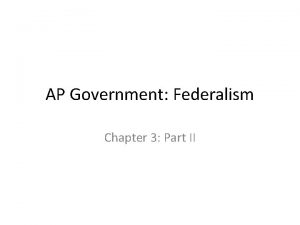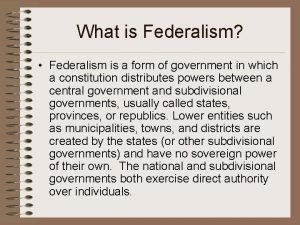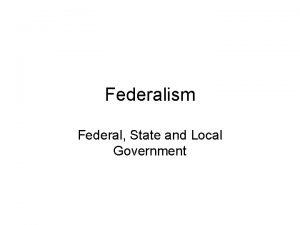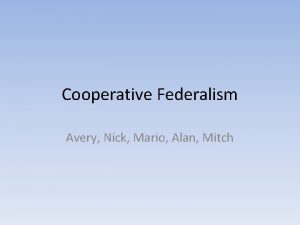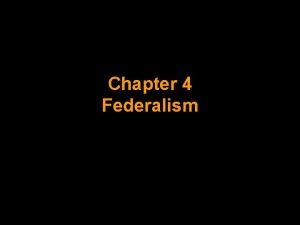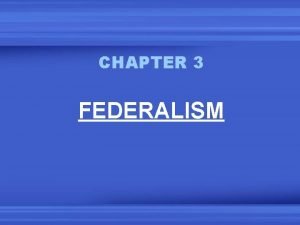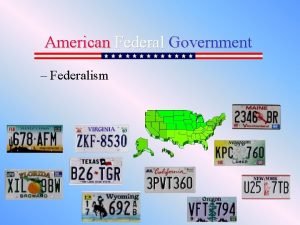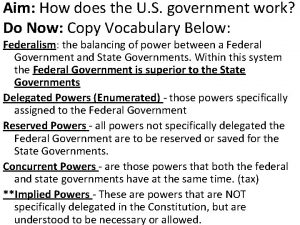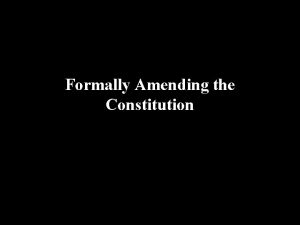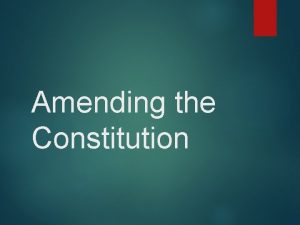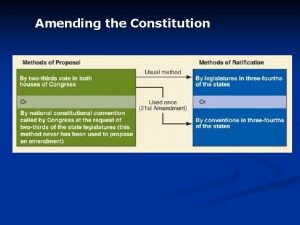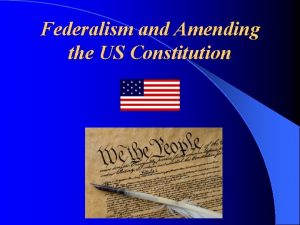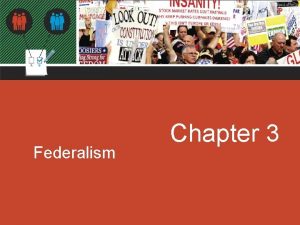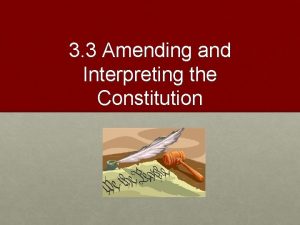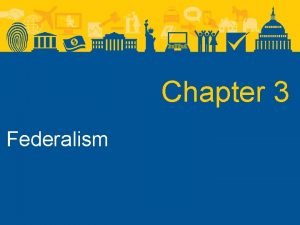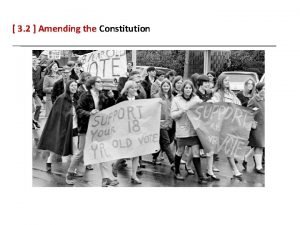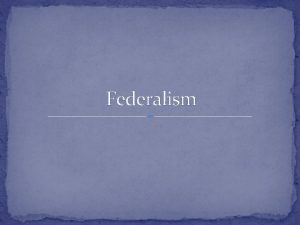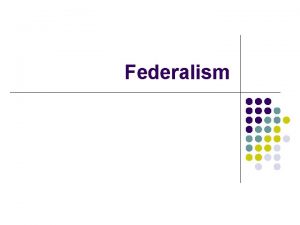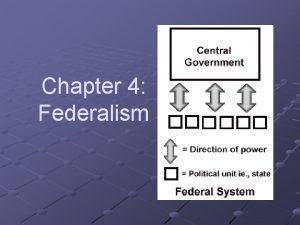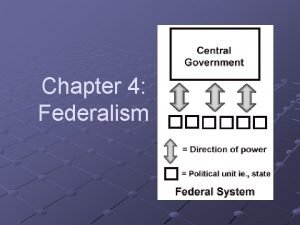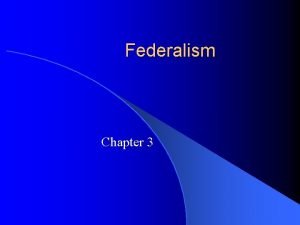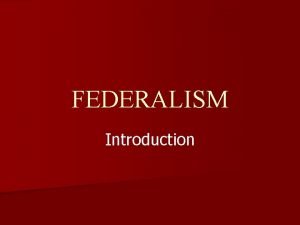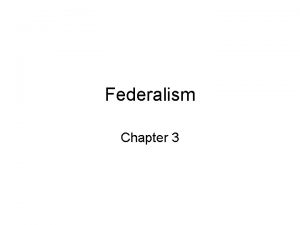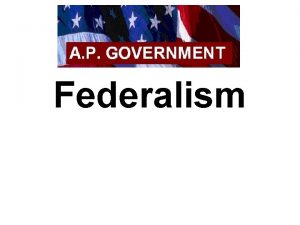Unit 2 Constitution and Federalism Amending the Constitution
































- Slides: 32

Unit 2: Constitution and Federalism

Amending the Constitution • Article V of the Constitution is critical to the document’s flexibility because it allows for the addition of amendments, which helps the government to adapt to changing times • There are 27 current amendments to the U. S. Constitution • 26 of these were proposed by Congress and ratified by state legislatures • Amendments can be added by any combination of step 1 and 2

Amendment Process Step 1 • Amendment can be proposed if 2/3 of both the Senate and House of Representatives agree OR • Amendment can be proposed if 2/3 of all state legislatures call a convention for proposing new amendments

Amendment Process Step 2 • Amendment is ratified if 3/4 of all state legislatures agree OR • Amendment is ratified if 3/4 of special ratifying conventions in each state agree


Types of Power in Constitution • Expressed: delegated to the national government in the Constitution • Inherent: belonging to the national government because it is the government of a sovereign state • Implied: powers given to the national government but not stated in the Constitution • Reserved: belonging to state governments and denied to the federal government; or left to the people under the 10 th Amendment

Discussion • Do you think we need any new amendments to the Constitution? • Do you think there will be any new amendments to the Constitution?

First Amendment Congress shall make no law respecting an establishment of religion, or prohibiting the free exercise thereof; or abridging the freedom of speech, or of the press; or the right of the people peaceably to assemble, and to petition the government for a redress of grievances. Summary: Freedom of religion, speech, press, assembly, and petition

Popular Sovereignty • The authority of the government is created and sustained by the consent of the people • Requires the free exercise of speech to maintain

Discussion • When is it acceptable to limit free speech? • How does the government maintain freedom of religion? • Should a public courthouse be allowed to display a Ten Commandments monument? • What about other religious monuments? http: //www. youtube. com/watch? v=L 5 Eix. DJ 25 Lc

Second Amendment A well regulated Militia, being necessary to the security of a free State, the right of the people to keep and bear Arms, shall not be infringed. Summary: Right to bear arms and organize a well regulated militia

Third Amendment No soldier shall, in time of peace be quartered in any house, without the consent of the owner, nor in time of war, but in a manner to be prescribed by law. Summary: No soldiers staying in your home

Discussion • Can the government limit the right to bear arms? • Should the government limit the right to bear arms? • If so, how? http: //foxnewsinsider. com/2014/01/23/watch-judgenapolitano-prediction-new-2 nd-amendment-casesupreme-court

Fourth Amendment The right of the people to be secure in their persons, houses, papers, and effects, against unreasonable searches and seizures, shall not be violated, and no warrants shall issue, but upon probable cause, supported by oath or affirmation, and particularly describing the place to be searched, and the persons or things to be seized. Summary: No unlawful search and seizure of property, warrants must be based on probable cause

Fourth Amendment Explained • "legitimate expectation of privacy" • Ex: public restroom vs. front seat of car • Does not apply to searches carried out by non-governmental employees like private security guards Violations of the Fourth • The exclusionary rule. If, upon review, a court finds that an unreasonable search occurred, any evidence seized as a result of the search cannot be used as direct evidence against the defendant in a criminal prosecution, state or federal. • Fruit of the poisonous tree doctrine. In addition to being excluded as evidence against the defendant, evidence resulting from an illegal search may not be used to discover other evidence, under a legal rule known as the "fruit of the poisonous tree" doctrine. The "tree" is the evidence that the police illegally seize in the first place; the "fruit" is the second-generation product of the illegally seized evidence. Both tree and fruit are inadmissible at trial.

Warrants Explained • If the person in control of the premises freely and voluntarily agrees to the search, the search is valid and whatever the officers find is admissible in evidence. Police officers do not have to warn people that they have a right to refuse consent to a search • Police officers do not need a warrant to search and seize contraband or evidence that is "in plain view" if the officer has a right to be where the evidence or contraband is first spotted • Police officers do not need a warrant to make a search "incident to an arrest. ” • As a general rule, the police are authorized to make a warrantless search when the time it would take to get a warrant would jeopardize public safety or lead to the loss of important evidence.

Fifth Amendment No person shall be held to answer for a capital, or otherwise infamous crime, unless on a presentment or indictment of a grand jury, except in cases arising in the land or naval forces, or in the militia, when in actual service in time of war or public danger; nor shall any person be subject for the same offence to be twice put in jeopardy of life or limb; nor shall be compelled in any criminal case to be a witness against himself, nor be deprived of life, liberty, or property, without due process of law; nor shall private property be taken for public use, without just compensation.

Fifth Amendment Summary: You can’t be charged for the same crime twice Every citizen gets due process You don’t have to testify against yourself Eminent Domain

Limited Government • No government is all-powerful. The acts of the government are those willed by the people.

Discussion • What is an unreasonable search versus a reasonable one? • Do you agree or disagree with the idea below? An innocent person shouldn’t mind if the police search his house without a warrant. Why should he care if he has nothing to hide?

Sixth Amendment In all criminal prosecutions, the accused shall enjoy the right to a speedy and public trial, by an impartial jury of the state and district wherein the crime shall have been committed, which district shall have been previously ascertained by law, and to be informed of the nature and cause of the accusation; to be confronted with the witness against him; to have compulsory process for obtaining witnesses in his favor, and to have the assistance of counsel for his defense. Summary: Speedy and public trial, informed of accusation, confrontation of witness, right to lawyer

Seventh Amendment In suits at common law, where the value in controversy shall exceed twenty dollars, the right of trial by jury shall be preserved, and no fact tried by a jury, shall be otherwise re-examined in any court of the United States, than according to the rules of the common law. Summary: Trial by jury in civil cases

Discussion • Why should a trial be speedy and public? • Should there ever be a limit on the right to confront the witness against you? • Do non-citizens have the right to be informed of the accusations against them? • What about suspected terrorists?

Eighth Amendment Excessive bail shall not be required, nor excessive fines imposed, nor cruel and unusual punishments inflicted.

Ninth Amendment The enumeration in the Constitution, of certain rights, shall not be construed to deny or disparage others retained by the people. Summary: This list of rights doesn’t mean that citizens can be denied other rights not included

Tenth Amendment The powers not delegated to the United States by the Constitution, nor prohibited by it to the States, are reserved to the states respectively, or to the people Summary: Powers not given to the national government are reserved to the states or the people

Discussion • What should be the test for determining when prison conditions constitute cruel and unusual punishments? • Is it unconstitutional to: • Confine an inmate in a 4 x 6” cell? • Keep cells at 55 degrees? • Beat prisons, but without causing severe damage? • Is the death penalty cruel or unusual punishment? • If it’s allowed, how should it be administered? • Can someone be executed for a crime committed as a minor?

National Powers • Coin money • Raise and maintain armed forces • Regulate immigration • Regulate foreign trade • Acquire territory • Treaty making powers • Declare war

Shared/Concurrent Powers shared by both State and National governments • Levy and collect taxes • Borrow money • Establish courts • Define crimes and set punishments • Claim private property for public use

State Powers • Regulate trade and business within the state • Pass license requirements for professionals • Regulate alcoholic beverages • Conduct elections • Establish public school system • Enact uniform marriage and divorce laws • Set up units of local government within the state

City Government City—Maintains city records, makes and maintains city laws • Mayor • City Manager • City Council • City Attorney • Municipal Courts

County Government County – Maintains city records, makes and maintains county laws • County Judge • County Clerk • Constables • County Attorney • Tax Collector/Assessor
 Informal methods of amending the constitution
Informal methods of amending the constitution Formal amendment
Formal amendment Pubilus
Pubilus Federalism in the constitution
Federalism in the constitution Federalism in the constitution
Federalism in the constitution Texas constitution vs u.s. constitution venn diagram
Texas constitution vs u.s. constitution venn diagram Nc constitution vs us constitution
Nc constitution vs us constitution Constitution what is constitution
Constitution what is constitution The constitution lesson 1 principles of the constitution
The constitution lesson 1 principles of the constitution Difference between regionalism and federalism in a sentence
Difference between regionalism and federalism in a sentence Unit 10, unit 10 review tests, unit 10 general test
Unit 10, unit 10 review tests, unit 10 general test Features of federalism
Features of federalism Nationalist position definition
Nationalist position definition Federalists and anti-federalists
Federalists and anti-federalists Federalism
Federalism Types of federalism
Types of federalism Types of federalism
Types of federalism What is the basic premise of federalism
What is the basic premise of federalism Full faith and credit clause examples
Full faith and credit clause examples Federalism
Federalism Fiscal federalism definition ap gov
Fiscal federalism definition ap gov Advantages of federalism
Advantages of federalism Dual federalism
Dual federalism Federalism powers divided worksheet
Federalism powers divided worksheet Dual federalism
Dual federalism Dual federalism
Dual federalism Federalism cartoon explanation
Federalism cartoon explanation Cooperative federalism
Cooperative federalism Chapter 4 section 1 federalism the division of power
Chapter 4 section 1 federalism the division of power Dual federalism
Dual federalism Enumerated powers definition ap gov
Enumerated powers definition ap gov Federalism definition
Federalism definition Federalism venn diagram
Federalism venn diagram
